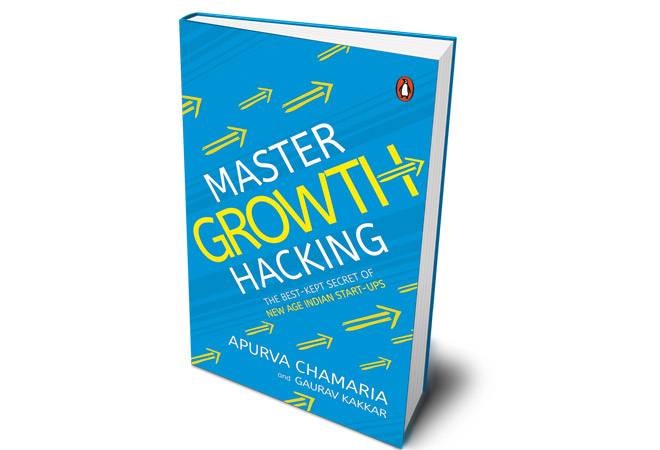

Start-ups seem to be dominating the world of business. Some of the richest global corporations – Apple, Amazon, Alphabet (Google), Microsoft and Facebook – were start-ups not so long ago. Volumes have been written about them and their founders; their successes have been celebrated and growth strategies deciphered. Those inspiring stories have given rise to the big start-up dream chased by every entrepreneur worth her salt. In India, too, new-age companies are out there, solving pain points and coming up with radical products. A handful of them have grown substantially, but many of them have folded up. Nevertheless, these success stories have fuelled a start-up boom in the country, which has been patronised not only by local and global investors but also by governments. “The Start-Up India; Stand-Up India” campaign initiated by the Narendra Modi government is one of the best examples.
Against this backdrop, Master Growth Hacking, penned by veteran digital marketers Apurva Chamaria and Gaurav Kakkar, could be a valuable guidebook for all who want to join the start-up bandwagon or wish to know more about the ecosystem. The book features a potent cocktail of start-up case studies, founders’ tips and insight into technicalities that explain how to ‘growth hack’ or grow quickly using a combination of tools and tactics – from product strategy to data analytics to successful marketing, resulting in quick customer acquisition and long-term retention. The writers have further provided a blueprint for building a growth-hacking team that organisations require across growth stages.
All these may help resolve a key point of contention, that of growth versus sustainability. While rapid growth is essential in a fast-and-fierce digital environment, a company should not be burning a huge amount of cash to fuel that growth. There is another way of doing it, via growth hacking. “Growth hacking is about a mindset – small yet significant and often counterintuitive interventions that are part of an organisation’s lifeblood,” says Info Edge Co-founder Sanjeev Bikhchandani in his foreword. And all nine chapters of the book live up to it as each contains a company case study, founder’s interview and lucid description of a specific component of growth hacking. Founders of leading start-ups, including Zomato, IndiaMART, ShopClues, UrbanClap, Paisabazaar, Furlenco, FusionCharts, WittyFeed and UpGrad, have explained how they pushed strategic measures during the growth phase.
A lot depends on marketing, though. Somewhere in the middle, while discussing the growth hacking process and tactics, the authors refer to a Microsoft study that says the attention span of human beings (at eight seconds) is less than that of a goldfish (nine seconds). “If marketers do not capture attention during those eight seconds, the visitor will start looking for the information she wants on some other website,” the study says. The solution, typical to online marketing, lies in tactics such as using SEO and SEM for enhanced visibility, using content to build trust, interaction on social platforms and creating a strong call to action. Also, there is some advice to optimise the use of print advertisements for maximum impact. Pallav Nadhani, Co-founder and CEO of FusionCharts, talks about the problems the team faced with print ads and why the company still wanted it as part of its growth-hacking strategy.
The book provides excellent, practical tips that helped India’s start-up poster boys to expand their reach and build a customer base exponentially. But here you find no secret formula to make a start-up profitable. On the other hand, Vijay Singhal, Co-founder and CEO of WittyFeed, has made a succinct observation in the book that will hold true: Always keep the marketing goals linked to your sales objectives, and the day you feel a growth hacking strategy might affect your sales figures, put a lid on it. Money matters!
[“source-businesstoday”]
